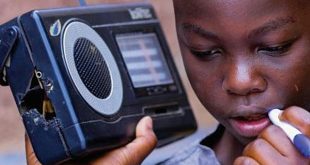
Darova, Romania | AFP | Maria Avadanei is exhilarated: after receiving a tablet as a donation, she can finally take her online lessons.
“I was afraid of failing my classes,” says the 15-year-old from Darova, a rural commune in Transylvania in western Romania.
Avadanei is among hundreds of thousands at increased risk of social exclusion after the coronavirus pandemic forced schools to close in Romania and Bulgaria, two of Europe’s poorest countries.
A mobile phone belonging to her mother, unemployed since November, is hardly enough for the family of seven — and besides, “it’s an old model”, the teen tells AFP.
A short distance from where Avadanei lives, in a little house perched on a hill, the four Ciurescu children are bickering over their family’s phone, also shared between them.
“One of them often has to interrupt his lesson to give the phone to his brother or his sister,” says father Danut, who works as a day labourer.
Romania has decided to keep schools closed until September in its fight against the virus, which has so far killed more than 1,000 people in the EU member nation of nearly 20 million.
“Vulnerable children have found themselves in a critical situation of marginalisation and social injustice,” says Gabriela Alexandrescu of Save the Children’s Romania office.
“Being excluded from the education process is traumatic for them.”
– Second-hand tablets –
After being criticised for making distance learning compulsory without supporting disadvantaged students, the government has promised to spend about 30 million euros ($32 million) on tablets.
Some 250,000 students do not have computer access, according to the government, though a survey by the IRES economic research institute found the actual number could be more than 900,000, or almost a third of all students.
Romanian education suffers from a chronic lack of funds: about 1,000 out of 6,300 schools still don’t have running water.
Volunteers have jumped in where authorities have been slow to act.
In an improvised workshop in Timisoara city, about an hour from Darova, Radu Ticiu and a dozen volunteers from EducaTM, an NGO, repair and disinfect a heap of tablets, smartphones and laptops before distributing them to poor children.
The Avadanei family was one of the beneficiaries.
“More and more people and companies are contacting us to offer us equipment that they no longer use,” Ticiu tells AFP.
“Dear child, be strong, do your best to progress” is the message that comes with one used laptop, which a mother donated.
Other initiatives, similar to that of EducaTM, have multiplied since the beginning of the crisis.
Roma activist Valeriu Nicolae this week organised online lessons for pupils in a Bucharest ghetto and distributed food packages in the capital’s suburbs.
The former United Nations expert and his team also installed 30 computers for families in Nucsoara in central Romania.
– Teachers’ efforts –
In Bulgaria, where schools will not reopen before the summer either, teacher Iliyan Markov goes three times a week to the Asenov family living in a Sofia suburb to bring four of their children lesson print-outs and collect their homework.
“I don’t have the money to buy a computer,” says the mother, Bozhura, who struggles to help her children even though she herself finished high school.
In Razhena in southern Bulgaria, teacher Tsvetelina Andonova aims to reassure her students, some of whom are worried about parents who work abroad.
To keep them entertained, she launched a reading competition: each student should summarise the pages read the day before.
Preparing and holding online courses is much more demanding, says Nadia Verba, a teacher at Darova in Romania.
“But it’s well worth it,” she says. “The enthusiasm of children when they connect is boundless.”
 The Independent Uganda: You get the Truth we Pay the Price
The Independent Uganda: You get the Truth we Pay the Price


